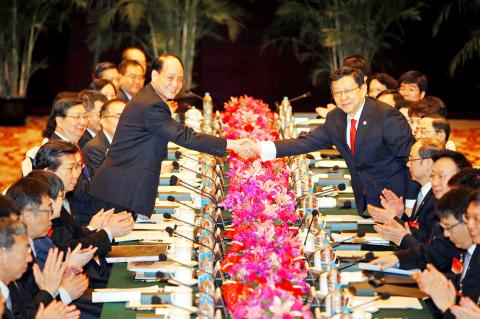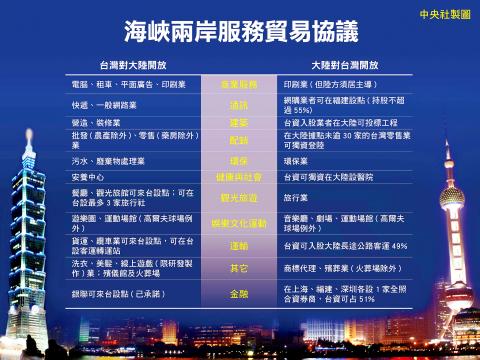|
Cross-strait service
trade pact signed
DEEPENING EXCHANGES: Under the pact, 64
Taiwanese industries will be opened to Chinese investment, while China will open
up 80 industries to Taiwanese investment
By Mo Yan-chih / Staff reporter

Straits Exchange Foundation
Chairman Lin Join-sane, left, shakes hands with his Chinese counterpart,
Association for Relations Across the Taiwan Straits Chairman Chen Deming, during
a meeting in Shanghai yesterday.
Photo: CNA

Industries in which trade in
services will be opened up according to a cross-strait service trade pact is
shown in a chart released yesterday. The pact was signed yesterday in Shanghai
between Taiwan¡¦s Straits Exchange Foundation and China¡¦s Association for
Relations Across the Taiwan Straits.
Photo: CNA
The Straits Exchange Foundation and the
Association for Relations Across the Taiwan Straits (ARATS) yesterday signed a
cross-strait service trade agreement in Shanghai during the ninth round of
cross-strait talks, opening the service sectors on both sides to further
cross-strait exchanges.
Under the pact, which includes four chapters and 24 articles, 64 Taiwanese
industries will be opened to Chinese investment, while China will open up 80
industries to Taiwan.
The Taiwanese industries include transportation, tourism and traditional Chinese
medicine, while China will open up its finance, retail, electronics, publishing
and travel sectors.
Under the agreement, Chinese investors will be allowed to open hotels in Taiwan.
Taiwan will also allow Chinese travel agencies to establish a maximum of three
branches in the country and provide services to Taiwanese. However, they will
not be allowed to accommodate any foreign tourists, including Chinese.
Taiwanese investors will be allowed to set up travel agencies in China, as well
as open restaurants or hotels.
Chinese companies will be allowed to open beauty parlors or hair salons in
Taiwan, but would only be allowed to employ Taiwanese.
While China will open its publishing industry to Taiwanese investment, Taiwan
will allow Chinese companies to invest in Taiwanese businesses in the printing
service industry, with a maximum of 50 percent stock ownership.
On financial services, Taiwanese companies will be allowed to invest security
companies in Shanghai, in Shenzhen and Chinese-controlled Fujian Province.
In signing the pact, foundation Chairman Lin Join-sane (ªL¤¤´Ë) and ARATS Chairman
Chen Deming (³¯¼w»Ê) both lauded the agreement for deepening cross-strait exchanges
in the service sector.
Lin said 80 percent of the deal opens the two sides¡¦ service sectors to the same
or greater degree as the Closer Economic Partnership Arrangement (CEPA) that was
signed between Hong Kong and China in 2003, with 90 percent of financial
services covered in the cross-strait agreement opened, just like in the CEPA.
The cross-strait service trade agreement is a major follow-up to the Economic
Cooperation Framework Agreement (ECFA) and the General Agreement on Trade in
Services under the WTO.
¡§The service trade agreement is a pact that benefits related sectors across the
Taiwan Strait and promotes the interests of the public on both sides. It will
result in a win-win situation for both sides,¡¨ Lin said.
After signing the pact, Taiwan and China cannot revise or cancel the agreement
within the next three years.
The two sides will hold an annual meeting to review the implementation of the
pact.
The agreement also includes an emergency negotiation mechanism, which gives
related industries from each side the right to demand negotiations and seek
solutions if the agreement negatively affects their businesses sectors.
|
![]()
![]()
![]()